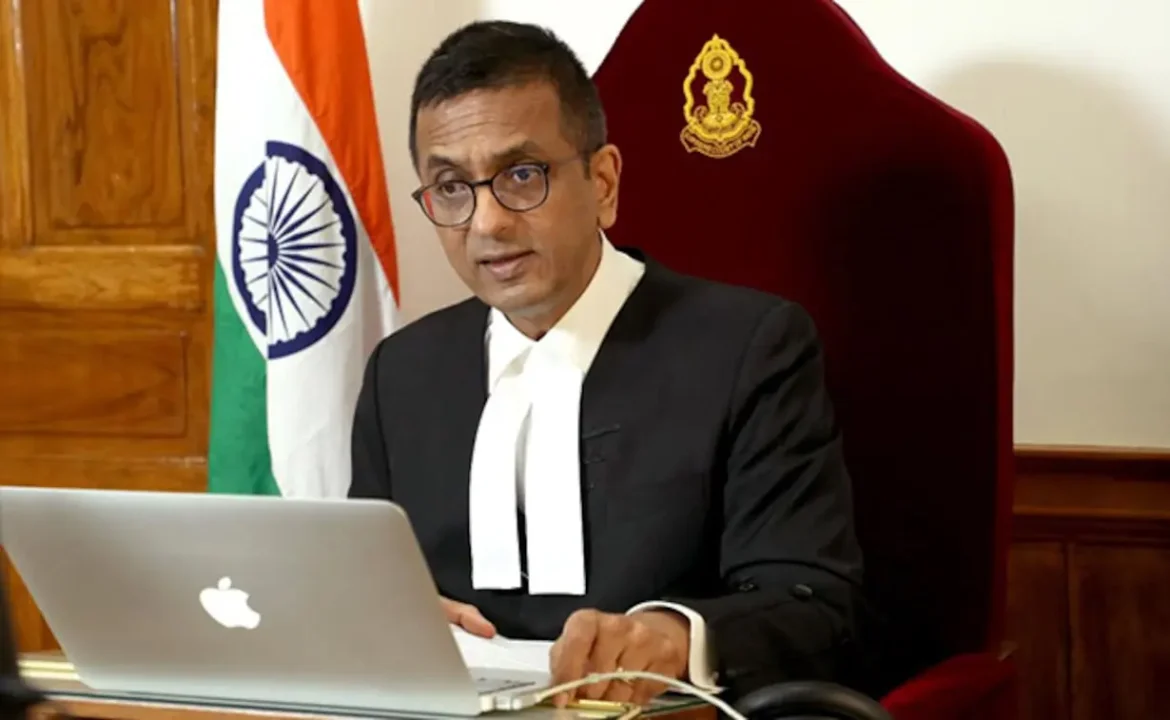Chief Justice of India on Ayodhya controversy has spoken about the landmark resolution of the Ram Janmabhoomi-Babri Masjid dispute. In a recent public address, Chief Justice DY Chandrachud reflected on the case and shared his personal thoughts on the resolution of the long-standing conflict. The CJI expressed how he prayed for divine intervention in finding a peaceful solution, highlighting the significance of faith in the judicial process.
CJI Chandrachud’s Reflections on Ayodhya Verdict
Chief Justice of India on Ayodhya controversy remarked that the Ayodhya dispute, which had been in front of him and other judges for three months, was not just a legal challenge but a deeply sensitive issue for millions. While addressing residents of his native Kanhersar village, he stated, “I sat before the deity and told him he needs to find a solution.” He emphasized the importance of faith, saying, “Believe me, if you have faith, God will always find a way.” This personal insight offered a rare glimpse into the CJI’s reflections on the Ayodhya case, which he described as a significant moment in India’s legal and spiritual history.
The Supreme Court’s Landmark Verdict
The Chief Justice of India on Ayodhya controversy played a pivotal role in the final resolution of the long-standing dispute. On November 9, 2019, a five-judge bench of the Supreme Court, led by then Chief Justice Ranjan Gogoi, delivered a unanimous verdict on the Ram Janmabhoomi-Babri Masjid case. The decision paved the way for the construction of a Ram temple at the disputed site in Ayodhya, while allocating a separate five-acre plot for a mosque within Ayodhya.
The bench, which included Justice Chandrachud, ruled in favor of Ram Lalla, the deity, and transferred the entire disputed land to a trust established by the government for the construction of the Ram temple. This judgment was seen as a historic step in resolving a conflict that had lasted for more than a century and was a source of communal tension in the country.
Prayers and Personal Reflections
Chief Justice of India on Ayodhya controversy shared his personal connection to the case and how he sought divine guidance during the proceedings. Asserting that he prays regularly, CJI Chandrachud recounted how he prayed for a resolution to the dispute, recognizing the weight of the matter not just in legal terms, but also in its spiritual and cultural importance.
His comments come after his visit to the Ram temple in Ayodhya in July 2023, where he offered prayers and reflected on the significant role the temple plays in Indian culture. This visit was another example of his personal engagement with the issue, beyond the legal proceedings.
The Historical Judgment and Its Implications
The Chief Justice of India on Ayodhya controversy highlighted the impact of the 2019 verdict, which not only settled a legal dispute but also represented a momentous shift in India’s socio-political landscape. The judgment was significant for its attempt to balance religious sentiments by ensuring that both Hindus and Muslims received land for worship, thus attempting to maintain harmony.
The resolution ended a 500-year-old debate over the land where the Babri Masjid once stood and where Hindus believe Lord Ram was born. The construction of the Ram temple began soon after the verdict, and in January 2024, the idol of Ram Lalla was consecrated in the temple. This ceremony marked the end of a long struggle for many devotees, bringing closure to the issue that had divided communities for generations.
Ram Mandir Pran Pratishtha Ceremony
The Chief Justice of India on Ayodhya controversy spoke about the importance of the Pran Pratishtha ceremony, which took place on January 22, 2024, marking the installation of the Ram Lalla idol in its final form at the Ram Mandir. The event was attended by prominent figures, including Prime Minister Narendra Modi, RSS chief Mohan Bhagwat, and Uttar Pradesh Chief Minister Yogi Adityanath. The unveiling of Ram Lalla’s idol symbolized the fulfillment of the court’s verdict and the end of Lord Ram’s “500-year exile.”
The Prime Minister offered prayers and performed the traditional ‘aarti’ and ‘Dandavat Pranam’ at the Shri Ram Janmabhoomi Temple. This event was seen as a significant moment in India’s cultural and religious history, reinforcing the impact of the Supreme Court’s decision.
Conclusion
The Chief Justice of India on Ayodhya controversy underscored the complex and deeply emotional nature of the Ram Janmabhoomi-Babri Masjid case. His reflections on the role of faith, both in the personal and judicial process, highlight the balance between law and spirituality in resolving one of India’s most divisive issues. The Supreme Court’s 2019 verdict marked the end of a historic legal battle, paving the way for the construction of the Ram temple and ensuring a place for both Hindu and Muslim communities in Ayodhya.
Stay connected to know more on arcnews.online for global news like Chief Justice of India on Ayodhya Controversy. For videos updates visit our YouTube. Do subscribe to Arcnews to get latest updates directly in your mail box.
Have A Great Day.


